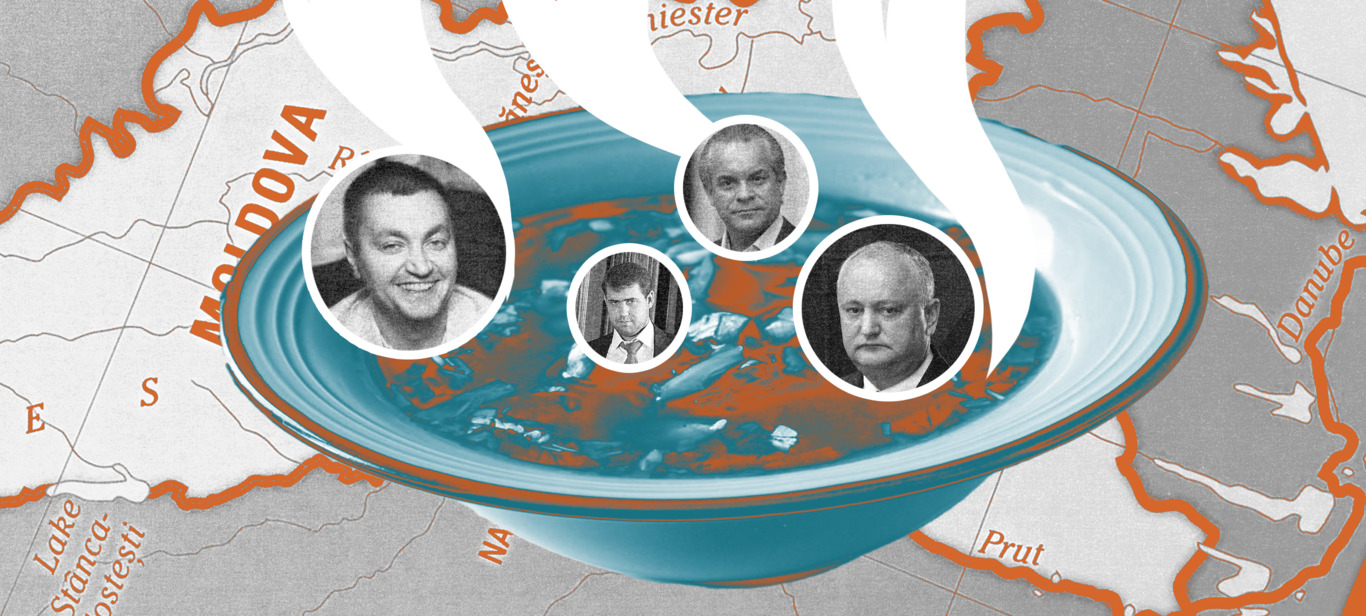Moldova and Ukraine have been following similar trends after the end of the Soviet Union. The countries share such issues as the dominance of oligarchic groups in the economic and political life; Russian imperialism’s attempts to establish its rule; high dependence on the Western imperialist partners. The full-scale Russian invasion of Ukraine strongly affected Moldova’s political life, but not only – attacks on Ukrainian civilian infrastructure has some parts of Moldova without electricity. To get to know more about the shared and different experiences of the two countries we decided to talk to Alexandru Leşanu, a historian whose research focuses on the post-Soviet transformation of Moldova and the political economy of Transnistria. In his papers he compared the economic structures of Transnistria and DPR.
Could you describe the politico-economic landscape of Moldova – what important assets are there, who owns what? What about Plahotniuc, are there other oligarchs, how important are they?
The politico-economic landscape of Moldova follows the trajectory of any other new state that emerged after the fall of the Soviet Union. The fuzzy legislation and the circumstantial political configurations makes business with the state the most lucrative form of business. Since the declaration of the Moldovan independence, all the members of the political spectrum have boasted about the democratic achievements of the Moldovan statehood with a specific emphasis on the regular and often sudden changes in the political leadership of the country.
In this context, the swift changes in the government came with the abrupt changes in the status of the oligarchs. The former shadow cardinals like Plahotniuc went into hiding immediately after the displacement of the Democratic Party from the government in 2019. However, the politico-economic landscape has not become more transparent or clear with the removal of Plahotniuc. On the contrary, if before it was clear that no major political or economic decision could be taken without the approval from Plahotniuc, now the politico-economic landscape became more opaque. Some other gangsters of the Moldovan political transition like Ilan Shor or Veaceslav Platon also went into exile and continue to use various legal or less legal routes to defend their economic assets.
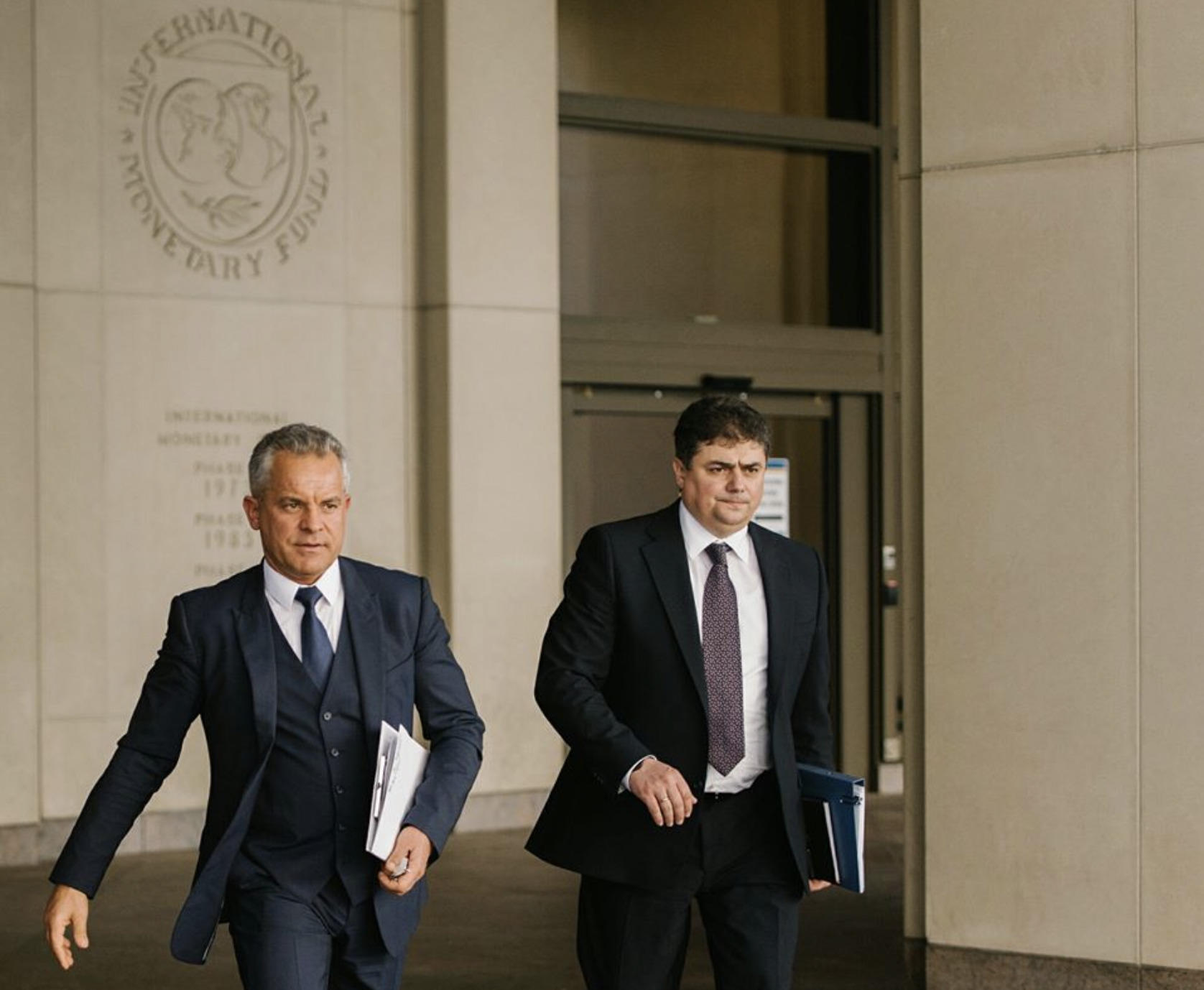
Volodymyr Plahotniuc (left) with the Executive Director of the International Monetary Fund and the representative of the Republic of Moldova on the IMF Executive Board, Menno Snel, Washington, USA, 2016. Photo: facebook.com/plahotniuc
What do you mean by the regime becoming more opaque? Could you elaborate on this argument?
Since the beginning of the Covid pandemic, Moldova has been living under the regime of emergency. After the end of the pandemic, the Moldovan authorities further extended the emergency regime, due to the Russian aggression in Ukraine. Under this emergency regime, a special government commission can issue many decisions in a non-transparent and sometimes even secret procedure. Under the pretext of ensuring the energetic security, the Moldovan authorities engage in some obscure negotiations with Gazprom and boast about outsmarting the Russian gas giant by designing some special formula for the calculation of gas price that in the end brought the Moldovan consumers to pay higher prices than the other consumers in the neighbor countries that did not apply any such special formula.
Then, with the exile of the major gangsters of the Moldovan post-Communist transition, the likes of Plahotniuc or Platon might be gone from the Republic of Moldova but their properties stayed behind. Consequently, they made sure to hire some expensive lawyers that contest every decision of the Moldovan authorities to confiscate or arrest their properties as a result of numerous penal charges.
To which extent is Moldovan economy dependent on trade either with EU countries or Russia? How does this influence country’s international policy and local politics?
At this moment, Moldova has very limited trade with the Russian Federation and this situation emerged mostly from the prohibitive initiatives of the Russian authorities which repeatedly sought to impose sanctions mainly against Moldovan agricultural products in response to what the Russian authorities considered to be anti-Russian policies on the part of the Moldovan government. On their part, Moldovan authorities have repeatedly declared that they would like to develop trade relations with Russia but without any political strings attached to the trade deals. After February 2022, it became very complicated for the Moldovan businesses to have any trade relations with their Russian partners due to the lack of any transit possibility via Ukraine. So, the only Moldovan trade with Russia is the import of Russian gas that goes into the maintenance of the energy voracious Transnistrian industries.
Otherwise, the European Union has consolidated its role as the main trading partner of the Republic of Moldova. So, one can say that Moldova is already part of the EU in economic terms and also in terms of numerous of its citizens who established themselves in the EU mostly as Romanian citizens.
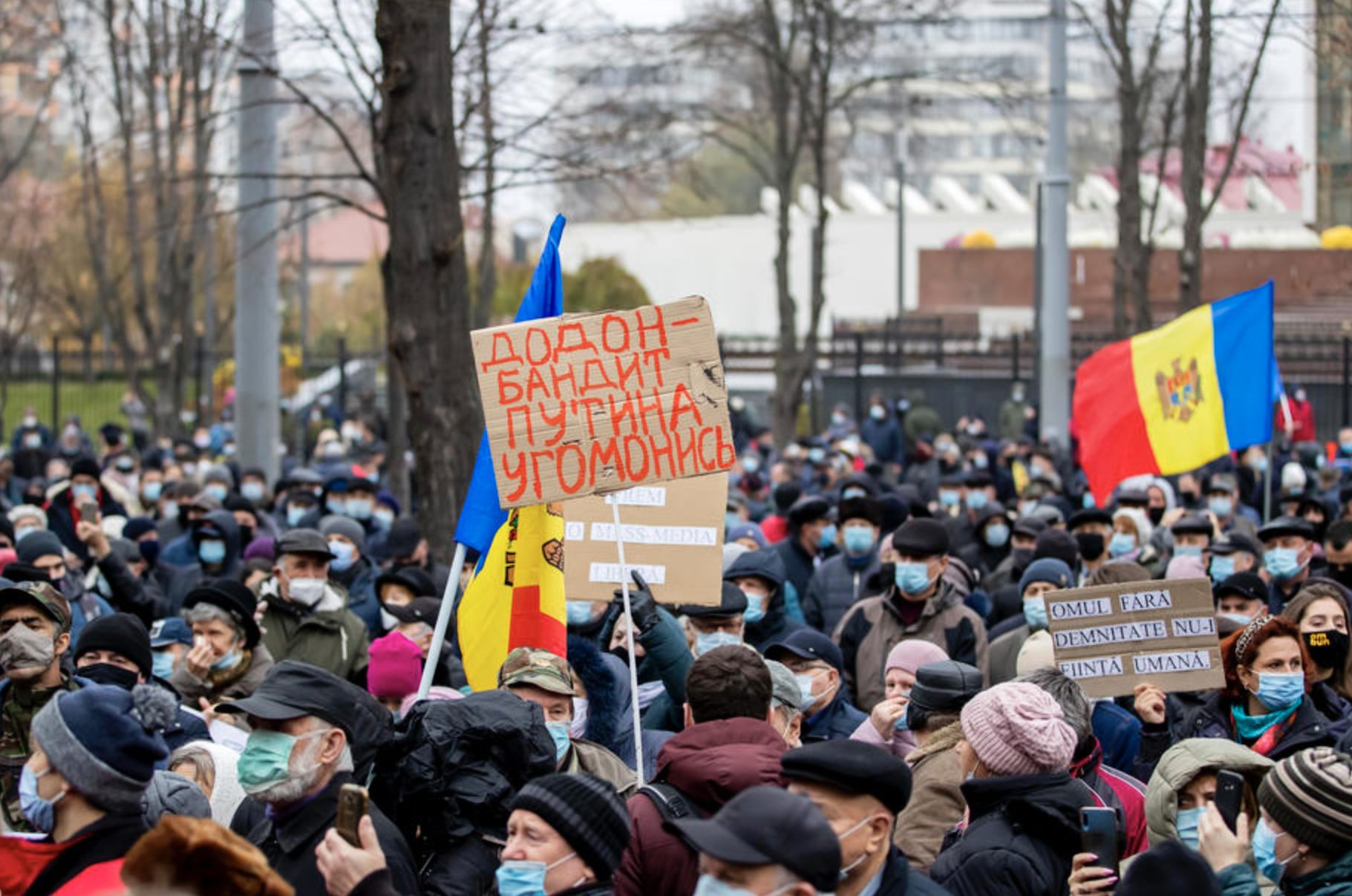
Protesters demand extraordinary parliamentary elections, Chisinau, Moldova, 2020. Photo: EPA / DUMITRU DORU
The opposition in Moldova is often described as pro-Russian. What are the connections of the opposition to Russia? And are there other kinds of opposition to the government apart from Igor Dodon?
I would say that while disguised as geopolitical competitors, the Moldovan political parties have been mostly vehicles to promote the interests of various politico-economic groups. In this sense, it is mainly a matter of political fashion that some parties subscribe to various (geo)political doctrines. While the interests of various international actors are obviously present in the Moldovan political landscape, the internal actors have the primary role in the configuration of the policies. The main interest of the representatives of the Moldovan opposition is to acquire as much political power as they can in order to preserve their economic assets and to avoid any problems with the law. For instance, Igor Dodon is accused of corruption and illicit enrichment and he pursues political influence with a clear thought to avoid prison. The same consideration can be applied to Ilan Shor who provides all kinds of support for a number of political projects in order to gain more political weight and to revise the decision of the Moldovan Supreme Court to condemn him for 15 years in prison.
You also have a language question in Moldova, does it provoke conflicts? Does it get instrumentalized politically? And how does it work in everyday life?
Of course, the language question is fundamental in the understanding of the Moldovan statehood. All the transformations in the late Soviet Moldavia started with the adoption of the Language Law by the republican Supreme Soviet in August 1989. The law simply stated that the Moldovan language became the official language of the Soviet Moldavia and that it had to change its script from the Cyrilic to Latin. The interesting detail is that the law didn’t actually diminish the role of the Russian language. In fact, it mentioned that Russian would continue to hold its function as “a language of interethnic communication.”
Nevertheless, due to the nationalistic rhetoric of the newly awakened national intelligentsia, the Russian speakers all over Moldavia felt threatened and especially the predominantly Russian speaking districts on the left bank of Nistru river declared their secession. On the whole, throughout the thirty something years of the Moldovan independence, the language issue recurrently emerged in the public discourse when the politicians in power sought to divert the attention of the population from the economic and social problems.
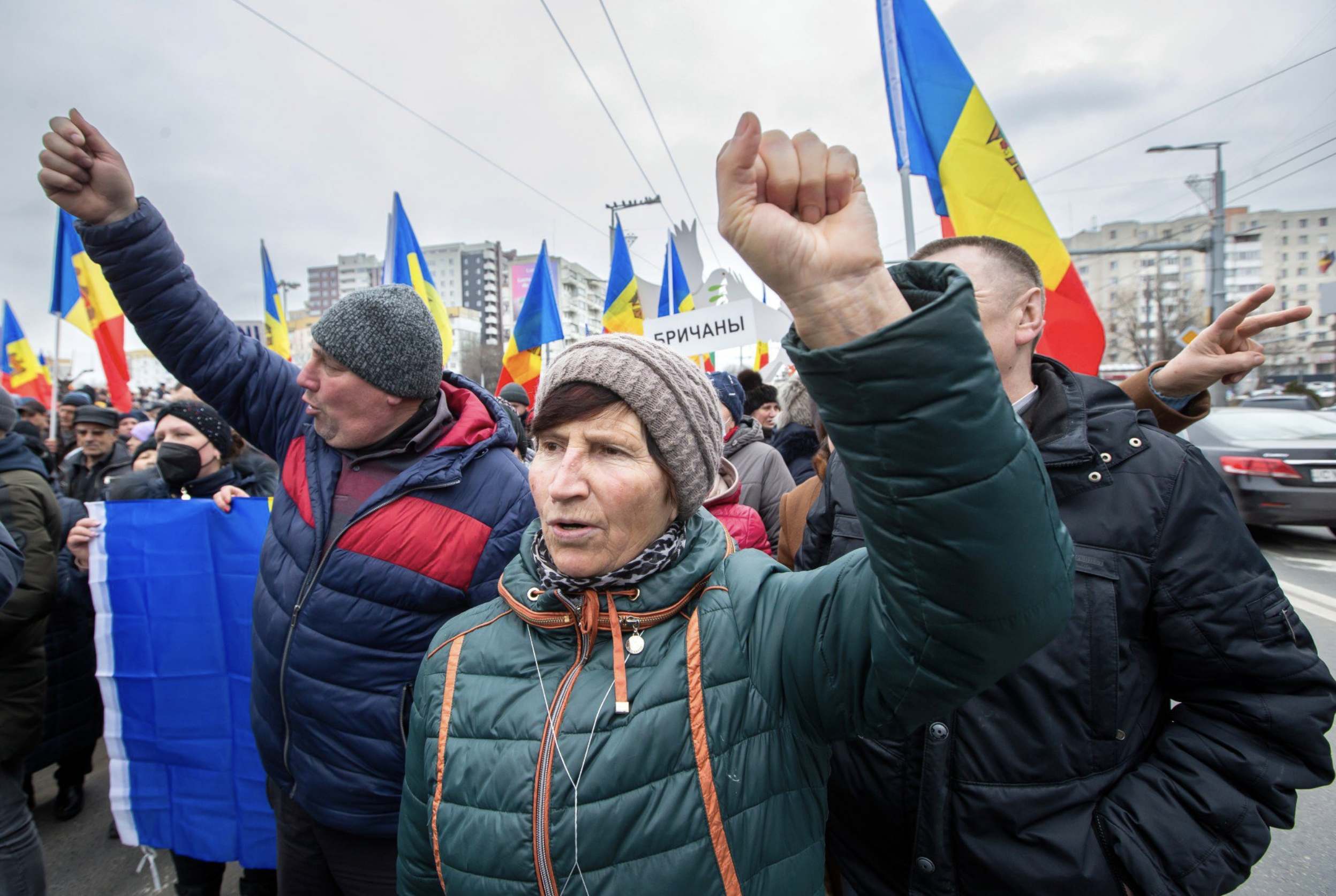
Supporters of the "ȘOR" party protest on the main street of Chisinau – they demand not to involve Moldova in the Ukrainian-Russian war, increase pensions and cover winter electricity bills, Moldova, February 28, 2023. Photo: EPA / DUMITRU DORU
Are there other stable socio-demographic, class or cultural divisions that are used by either parties in power or opposition in electoral campaigns?
Other two factors could be geography and ethnic identity, which often go together. For more than three decades since the declaration of the Moldovan independence, there have been very few certainties, but one certainly is the fact that the Gagauz Autonomous Region in the south of Moldova has never elected any pro-European majority in the local legislative assembly or as a head of the local government. The same applies to the mayor of Balti, the so-called northern capital and the second largest city in the country. By contrast, the central districts, where the Moldovans , or Romanians were the ethnic majority, have always voted for pro-European parties. In other words, following the analogy of the American electoral process, in its short history as a democracy, Moldova has already developed a rather solid division between the red and the blue states in its electoral process.
How does the Russian invasion of Ukraine manifest itself in Moldovan internal politics? Who and how instrumentalise it in national political struggles?
The Russian invasion of Ukraine did not diminish the number of the ingredients in the already spicy Moldovan political soup. On the one hand, it gave a very solid ground for the current pro-European government to argue that there is no alternative to the European integration of Moldova. Moreover, if before very few voices advocated to the Moldovan integration into NATO, now considerably more voices support the idea of the Moldovan integration in the North Atlantic bloc. Still, the number of those who support the integration into the EU is considerably higher than the number of NATO supporters.
Also, with the establishment of the emergency situation, some analysts started to argue that the Moldovan government uses the conflict in Ukraine as a bad excuse for the poor economic performance of the country and for the suppression of the opposition. The leaders of the opposition parties claim that the government closed some TV channels not because they were officially declared pro-Russian, but because they provided a media platform for the opposition.
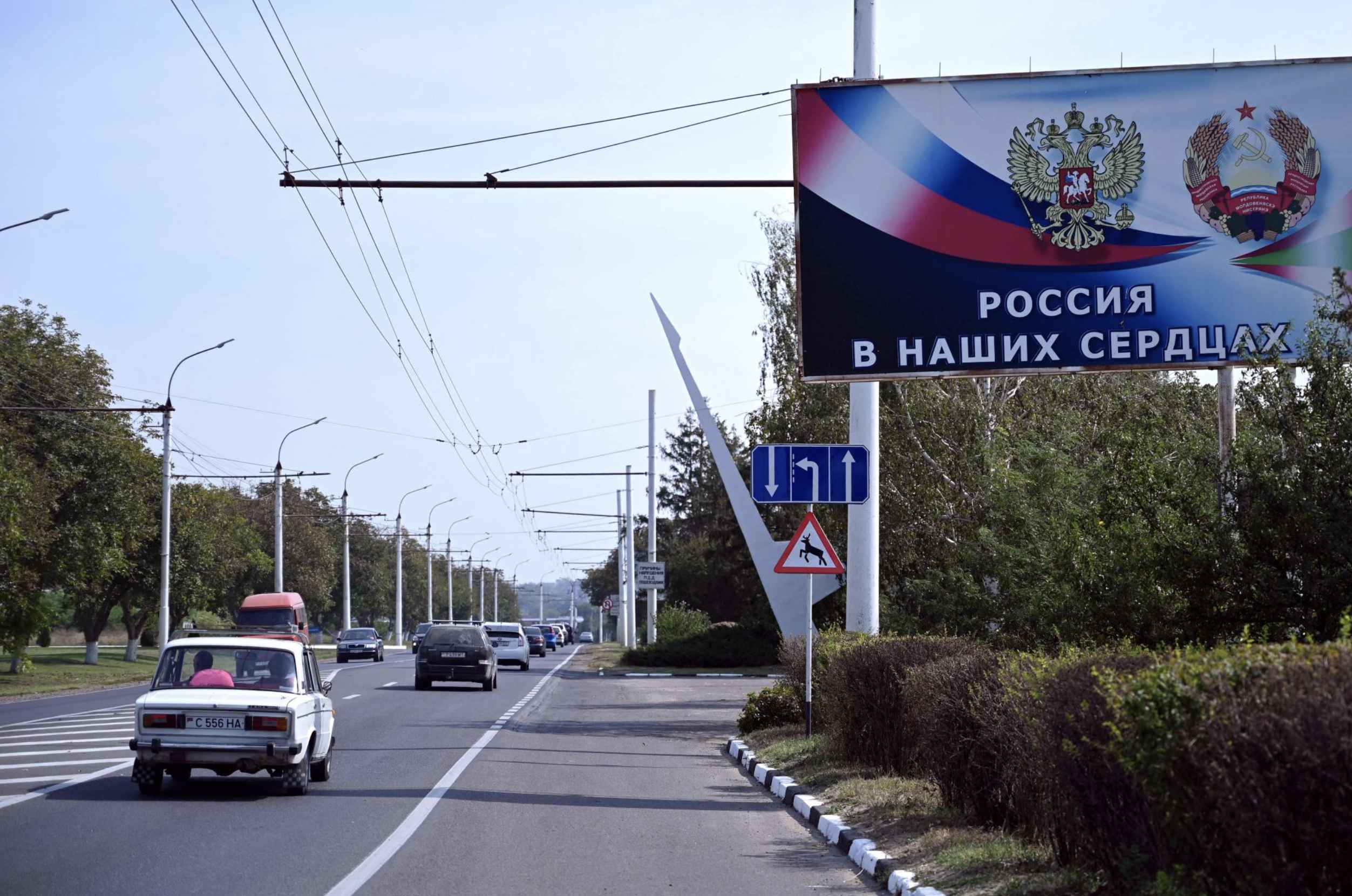
A billboard saying "Russia in our hearts" on the side of the road in the city of Tiraspol, the capital of Transnistria, on September 11, 2021. Photo: AFP / Sergey Gapon
What does the left and trade unionist scene look like in Moldova? How are they embedded into the local and regional political scene (roughly speaking, do they have relations with Russian politics, or rather with the EU)?
As in many other post-Soviet countries, immediately after the fall of the Soviet Union, all the local leftists lost their appeal to the population considering the previous seven decades of the Soviet emphasis on Marxism-Leninism. With the failure of the so-called self proclaimed liberals to improve the economic state of affairs, an increasing number of Moldovans started to look back to the Soviet Union as a period of prosperity.
In 2001 the Moldovan Communist Party gained a constitutional majority in the parliament. However, the coming of Communists to power did not mean the implementation of leftist policies. On the contrary, the Communist government solidified the oligarchic model of the local economy. It was Vladimir Voronin, the head of the Communist Party and the newly elected President of the Republic of Moldova, who granted various trade privileges to Vladimir Plahotniuc and his companies.
As for trade unions, they are almost nonexistent in the public discourse. They only emerge in the news along with some scandals in relation to the embezzlement of money from the discounted sales of their properties to closely associated businessmen.
Is there a leftist progressive scene in Moldova (at least on the local level)? Which issues does it bring to the public discussions or on the streets?
Regarding the evolution of the leftist political agenda, it has been going through a double crisis. I would call the first crisis a historical legacy crisis and the second crisis a synchronic crisis. The crisis of historical legacy is common to all the post-Communist countries, whereas the second crisis is a wider global phenomenon. With the disappearance of the Soviet Union, the leftist movements all over the world have lost some of their strength. In line with this global crisis of the leftist ideas, the few Moldovan NGOs that have embraced a leftist agenda tend to focus on narrow issues such as urban or cultural development rather than focusing on wider problems of social and economic inequality.
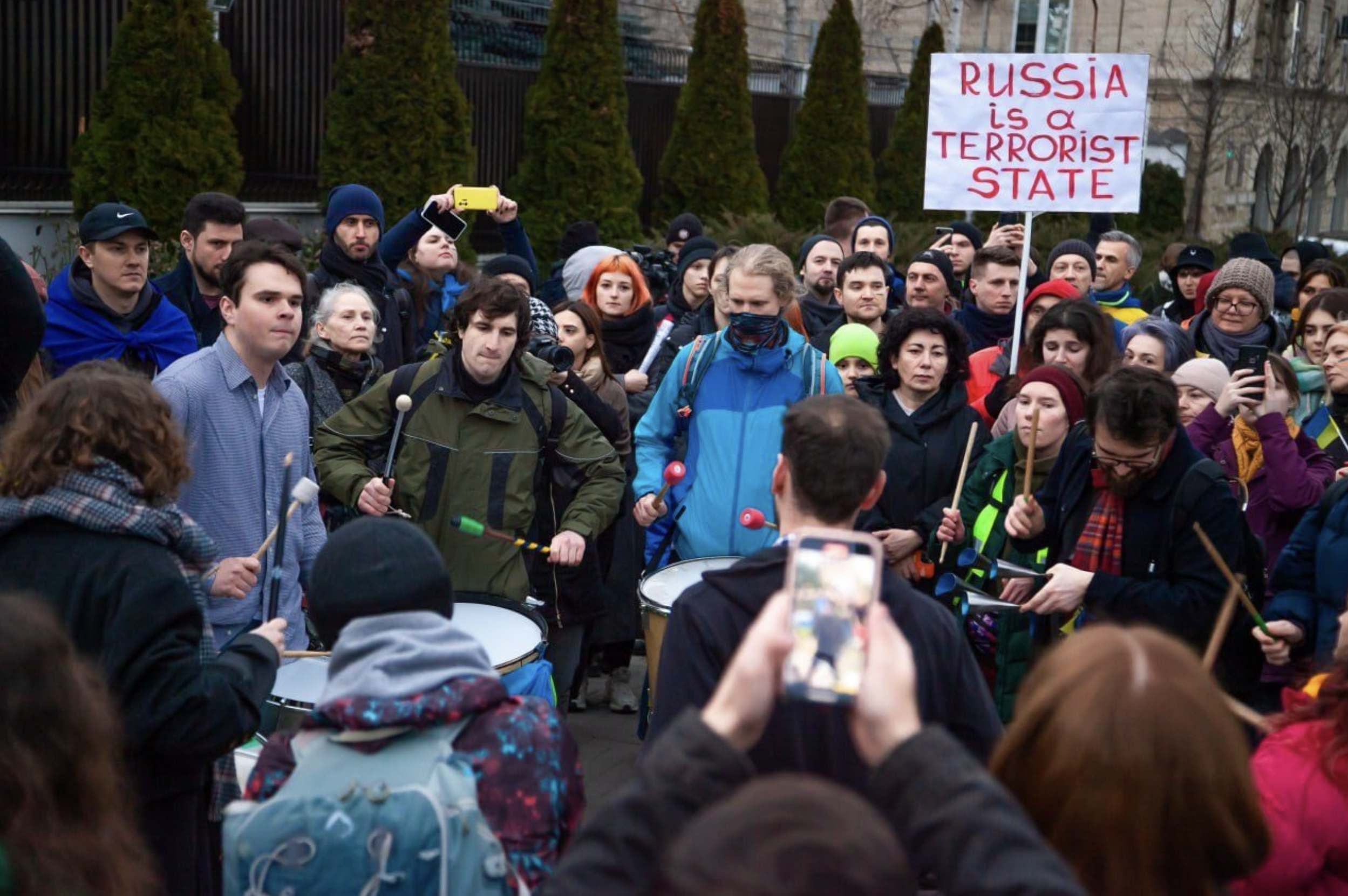
Rally at the Embassy of the Russian Federation in Chisinau, February 24, 2023. Photo: Anatoly Gilash
I would also like to discuss the situation in Transnistria. What are the politico-economic structures of Transnistria?
The politico-economic landscape of Transnistria is considerably less diverse than the political offer on the rest of the Moldovan territory. With the small exception of the period between 2011 and 2016, when the de facto President of the Pridnestrovskaia Moldavskaia Respublika (PMR) was Evgheny Shevchuk, all the political and economic power was in the hands of the Sheriff Holding – a conglomerate of companies with dominant position in all the branches of the Transnistrian economy. Throughout the three decades of the Transnistrian de facto statehood, Sheriff eliminated all its politico-economic competitors and acquired monopolistic power in this small portion of land between Ukraine and Moldova.
How did full-scale Russian invasion affect Transnistria? In terms of safety and economically?
During the first weeks of the Russian invasion, the Transnistrian politicians hoped that the Russian troops would complete a swift victory over Ukraine and would approach the Nistru River with the subsequent annexation of Transnistria, without excluding the possible annexation of the whole Republic of Moldova. After a couple of months, the rhetoric of the local politicians changed to the rhetoric of appeasement. In this sense, both Moldovan and Transnistrian politicians converged in their rhetoric with the emphasis to keep peace on the banks of Nistru. However, this consensus on the peace rhetoric could be disrupted at any time by the possible escalation of the Russo-Ukrainian war.
What was the role of economic ties and processes (both formal and informal) in this initial reaction and further changes in rethorics with the development of the war?
From its establishment as a de facto state, Transnistria has become a fruitful business not only for the local elite but also for the political and economic actors in the Republic of Moldova and Ukraine. As a matter of fact, from the outset of its establishment in the early 90’s Transnistria has been labeled as “a black hole,” which hosted many smuggling schemes starting with banal poultry and cigarettes and ending with weapons or enriched uranium for some “rogue actors.”
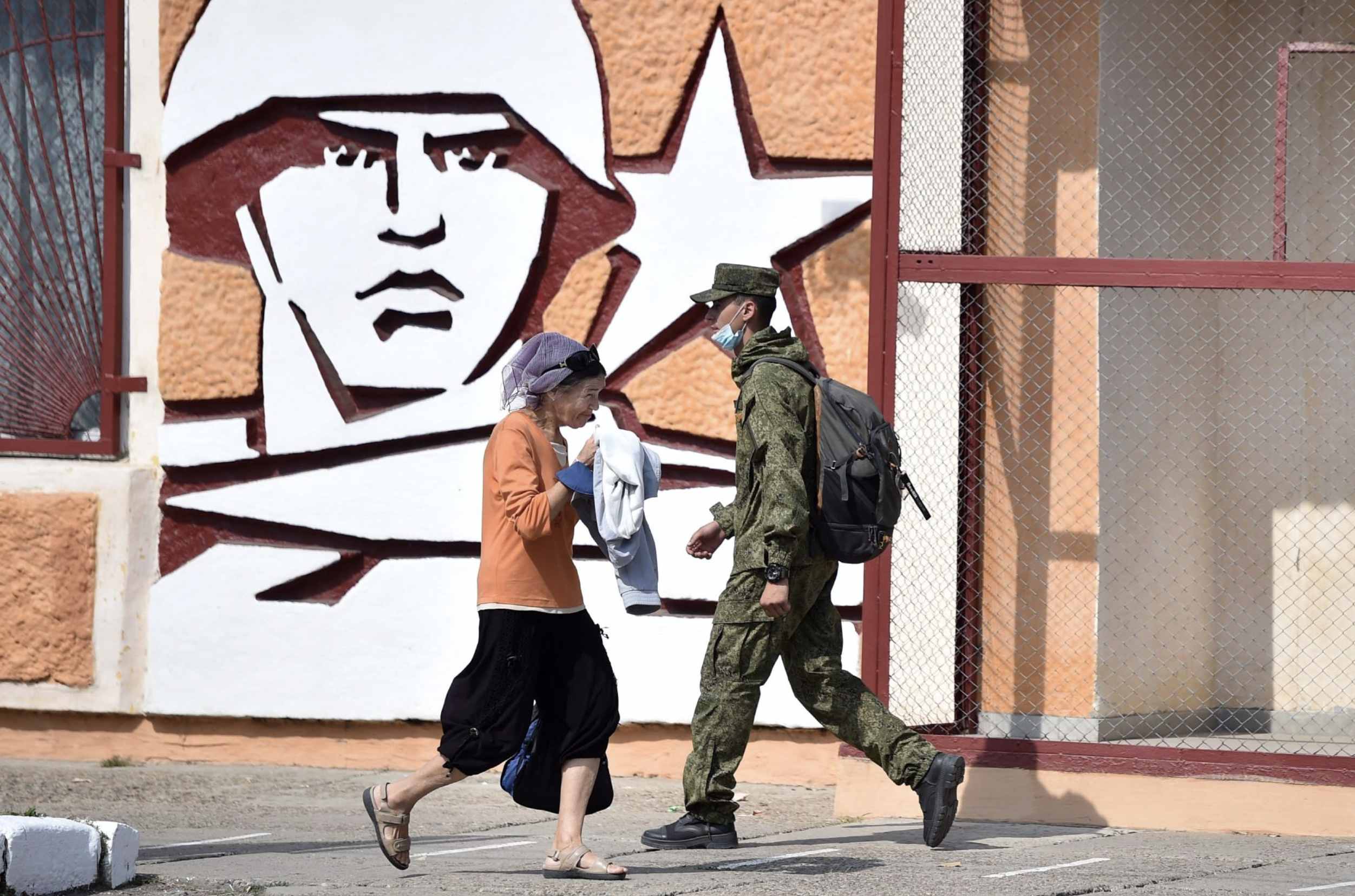
A soldier and a woman walk past the headquarters of the Operational Group of Russian troops in Tiraspol, the capital of Transnistria, on September 11, 2021. Photo: Serhiy Gapon / AFP
Unlike other post-Soviet de facto states such as Abkhazia, South Ossetia or Nagorno-Karabakh, the Transnistrian frozen conflict has never been an ethnic conflict. Even the de facto Transnistrian authorities recognize that Transnistria is made up of three main ethnicities: Russian, Ukrainian and Moldovan. Thus, it may as well be the case that the shady economic profit might be the only solid ground for the existence of the Transnistrian secessionist project.
With the escalation of the Russian-Ukrainian military conflict, Ukraine has closed its checkpoints on the Transnistrian segment of the Moldovan-Ukrainian border. Consequently, the risks of pursuing some economic profit by smuggling goods through this segment of the border have increased dramatically. In this context, the Transnistrian enterprises have to conduct their business through the Moldovan customs. Thus, for the first time in its short history, the Republic of Moldova fully controls the circulation of goods on its territory and the Transnistrian businesses have no other alternative but to integrate into the Moldovan customs, fiscal and economic system.
Talking about the future perspectives, what would be consequences of the weakening of Russia for Transnistria?
Undoubtedly the resolution of the Transnistrian frozen conflict is totally dependent on the outcome of the Russo-Ukrainian war. Both Russia and Ukraine hold important roles in the Transnistrian peace settlement, as both countries are members in the 5+2 negotiation format. In addition to Russia and Ukraine, the 5+2 settlement consists of OSCE, Moldova and Transnistria as full members and EU and US as observers. Considering this fact, the current negotiation format is on hold and the only possible talks are among the political representatives of Chisinau and Tiraspol with the objective to run the current affairs and to avoid any escalation. As long as the Russian-Ukrainian conflict is going on and nobody could possibly know its outcome, it is equally hazardous to pretend to know the future developments in the Transnistrian peace settlement.
Interviewed by editorial board of "Commons"
Cover: Kateryna Gritseva
